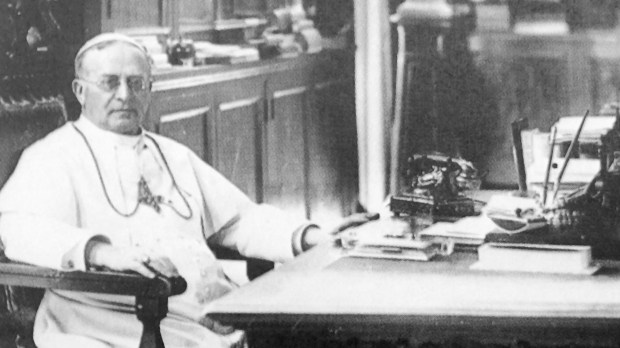Since February 24, 2022, the attitude of the Holy See regarding the Russian offensive in Ukraine has given rise to questions and misunderstandings, as Pope Francis has never denounced Russia by name. This tone is part of an old tradition of diplomacy at the Vatican, which has often been the only body to maintain open channels with all actors in international conflicts. I.MEDIA consulted with three specialists on the papacy to identify the guidelines of papal diplomacy since the First World War.
“When a nation is attacked, it has every right to defend itself,” explains Frédéric le Moal, historian and author of a book on Pius XII’s relationship with France during his election in 1939. He notes that the term “just war,” which has been the subject of a long doctrinal development over the centuries, is connected above all with the objective of “self-defense.”
Regarding the Ukrainian resistance, he assures that it is “fully” a case of self-defense, but that encouraging direct military aid could lead to a position of “co-belligerence.” This situation would give Vladimir Putin “the pretext for an even more aggressive policy” towards the West. “It is a very subtle balance, very difficult to find, and very dangerous,” notes the historian.
Pope Francis, like Pius XII and his other predecessors, knows that “overly brutal words against the enemy can have consequences for Christians. Thus, the goal of Vatican diplomacy is never to throw oil on the fire,” insists the specialist in military history. Avoiding the deadly spiral that could lead to a generalized conflict has been a fundamental concern of successive popes throughout history.
In 1939, Pius XII was reproached for not clearly denouncing the German aggression against Poland. Frédéric le Moal recalls that the Pope who reigned during the Second World War always maintained “an extraordinary prudence” in his interventions. The historian sees analogies with the attitude of Pope Francis towards Islamism and the Kremlin.
Moreover, the establishment of diplomatic relations between the Holy See and Russia under the pontificate of Benedict XVI, in a dynamic of rapprochement with the Orthodox world, makes it difficult to make any frontal criticism of Vladimir Putin. “It is possible that Pope Francis is being careful not to break this balance with Russia,” says the historian.
Talking with everyone, including violent powers
Frédéric le Moal reminds us that the realism of Vatican diplomacy leads it to “talk with everyone, including people who can appear truly brutal, even demonic,” he assures.
Thus the nunciature in Damascus was never closed during the civil war, despite the departure of a large part of the diplomatic corps. This strategy gave the papacy “possibilities of intervention, especially in a role of arbitration,” explains the historian.
The Holy See has thus found itself at the center of many mediations, from the Hundred Years War to more recent events, such as the resumption of relations between Cuba and the United States in 2014.
Paradoxically, the contemporary secularized world appears today to be more receptive to the contributions of papal diplomacy than the so-called “Christian” Europe of the beginning of the last century. The re-establishment of the credibility of the Holy See has been the fruit of several decades of effort, after a period of discredit of the pontifical institution in the eyes of Western governments.
1914-1918: a controversial papacy
During the First World War, the papacy experienced a decline in its international reputation due to differences between Pope Benedict XV and his Secretary of State, recalls historian Marcel Launay, author of a biography of the pontiff who reigned from 1914 to 1922.
In this context of chaos among European nations, Cardinal Pietro Gasparri was in favor of “absolute neutrality, so as not to antagonize any nation, because for the papacy, it was a way of seeking peace” without taking the position of the belligerents.
Benedict XV, on the other hand, considered that one could “interfere to try to arrange affairs in the name of a diplomacy that would be that of peace.” Explaining that “war is condemnable in any case,” he made “24 interventions in favor of peace and reconciliation.”
But as the fighting progressed, “the papacy would be criticized for its attitude of apparent neutrality,” recalls Marcel Launay. In this troubled context, the French called Benedict XV the “Germanophile Pope” and the German general, Erich Ludendorff, considered him, on the contrary, a “Francophile Pope.”
In the encyclical Ad beatissimi apostolorum, “from the beginning of his pontificate, he said, ‘We must seek peace, war is hateful,'” recalls the historian. As the pontificate evolved, “Benedict XV’s position finally prevailed over Gasparri’s.”
In August 1917, Benedict XV issued the most important intervention of the pontificate with the note he addressed to all nations, inviting them to “seek peace through disarmament.” This note, poorly received and misunderstood, led to the exclusion of the Holy See from peace treaty negotiations in 1919, recalls Marcel Launay.
From defending Catholics to a Church which is an “expert in humanity”
In the following decades, papal diplomacy gradually shifted its center of gravity. In the 1930s and 1940s, Pius XII’s fundamental concern was to limit the risks of persecution of Catholics by Hitler, in Germany as in the occupied countries, and by the Soviet regime.
Under the following pontificates, however, a change of perspective took place. “The Church wanted to be an ‘expert in humanity,’ so it no longer limited itself to defending Catholics, but really watched over the respect for justice towards all human beings, as well as the restoration of peace,” noted Frédéric le Moal.
Journalist Bernard Lecomte, who covered the pontificate of John Paul II and often reported from Eastern Europe, notes the “important turning point” taken during the pontificate of John XXIII, notably with his encyclical Pacem in Terris.
At the beginning of the 1960s, the “Good Pope” surprised and shocked some Catholics with his gestures of rapprochement with the USSR, which helped to avert the specter of an atomic war. The journalist explains that John XXIII’s contacts with Khrushchev “came to an end during the Cuban missile crisis, which coincided with the opening week of the Council.”
At the request of Kennedy’s entourage, the Italian pope successfully intervened with the Soviet leader, who said, “John XXIII and I got along well because we are both peasants.”
“There was therefore a kind of personal relationship, quite astonishing,” notes Bernard Lecomte.
This was followed by Paul VI’s cry—”Never again war, never again war”—at the UN in 1965. However, his pontificate was marked by the conflicts in Vietnam and Biafra. It was also the beginning of Ostpolitik in the Vatican.
The concept of “nation” legitimized by John Paul II
Elected in 1978, John Paul II took on a different strategy, emphasizing the defense of the Polish nation in the face of Soviet domination, as demonstrated by “his support for Solidarnosc, for the dissidents,” says Bernard Lecomte.
The Polish pope continued this logic at the beginning of the 1990s, taking sides with the Balkan populations seeking emancipation from the Belgrade regime, he points out.
“The independence of Croatia and Slovenia was recognized very quickly by the Holy See, even before the countries of the European Community,” recalls the biographer of the Polish pope. “These were two Catholic nations for which John Paul II had a special affection, as he did for all the Catholic communities of the East.”
This explicit and rapid papal support would be criticized during the fratricidal fights that would tear apart the countries of ex-Yugoslavia. But the defense of an oppressed population, including through armed resistance, was legitimate in the eyes of John Paul II. “When we are attacked by tanks, we respond with anti-tank missiles. Each situation has its own specific response,” Bernard Lecomte emphasized.
In his 2004 speech in Normandy, Cardinal Ratzinger, John Paul II’s representative for the June 6 commemorations, emphasized that the Allied landings were a moral necessity and showed “the unsustainable character of absolute pacifism.”
“The Normandy landing could not be carried out with scooters, that’s clear!” notes Bernard Lecomte, noting the full convergence between the Polish pope and his German successor, elected 60 years after the end of the Second World War.
Apparent successes and failures of a long-term diplomacy
In terms of diplomatic efforts, the beginning of John Paul II’s pontificate was marked by his successful mediation in the conflict over the Beagle Channel, a disputed border area on the southern tip of Latin America. “He did not want to let two Catholic nations, Argentina and Chile, go to war against each other,” recalls Bernard Lecomte, emphasizing the effectiveness of the mediation carried out by the nuncios sent by the Pope, which led to a peace treaty in the early 1980s.
The end of the pontificate was more bitter, as the immense international influence of John Paul II did not prevent him from experiencing disappointments. The Pope experienced a “total failure” during the 2003 American offensive in Iraq, according to his biographer. He “invested a lot” by sending Cardinal Pio Laghi to George W. Bush and Cardinal Roger Etchegaray to Saddam Hussein, and “it was all for nothing.” The reporter emphasizes, “Just because Vatican diplomacy invests itself in an issue does not mean that it will succeed.”
This attitude of John Paul II has nevertheless borne fruit in the long term, in the Iraqi population’s perception of the figure of the Pope. Bernard Lecomte recognizes that it is “quite likely” that the success of Pope Francis’ visit to Iraq in 2021 was linked to the Holy See’s constant attention to the Iraqi population, even when the country was a pariah on the international scene.
Despite apparent failures in the face of traumatic and violent events, the perseverance of papal diplomacy and the faithful attention of popes to populations martyred by war can therefore also be a valuable stepping stone to stitching up torn societies and reweaving peace in the long term.



